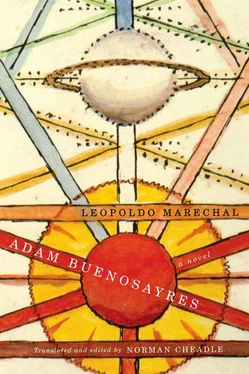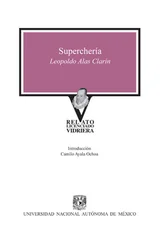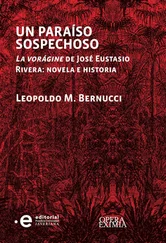After stamping a tender kiss on the athlete’s forehead, the philosopher turned him round with infinite care, and with a cordial boot in the behind sent him back to the circle of trotters. Then he extended his pole again until he’d tripped up another jogger. This one, getting back to his feet, rebuked Samuel mildly:
— You have no right to sabotage this Olympiad of sufficient reason! Who are you? I don’t recognize you.
— Take a good look at me, it’s well worth it! answered Samuel, showing off the figures on his kimono.
The runner looked at him a moment, went closer and sniffed, and then wrinkled his face in skepticism:
— It’s no use, he muttered at last. I detect in you a series of visual references: two horns, a clown’s outfit, volumes, colours, and lines. I smell you, and receive some olfactory data (which aren’t particularly pleasant, by the way). But I cannot reach “the thing in itself”: my sufficient reason will never attain it. 157
Proffering no comment at all, Samuel Tesler lifted his trusty pole and brought it down on the runner’s head.
— Why do you hit me? said he, not especially indignant.
— I’m not hitting you, answered Samuel. It’s a message sent from my thing-in-itself to your sufficient reason. Was the message received?
— Only a tactile reference, the runner sadly rejoined. The “thing in itself” remains isolated: I am an island, you are an island, he is an island, we are…
And he began to trot again, conjugating that rather cheerless verb. Samuel then stretched out his infallible pole for the third time. Two more runners kissed the cement track. One of them, fat and serene, got up without difficulty. The other was wearing horse blinkers, and seemed to be trying to decide whether to get up or not. This was the one Samuel spoke to:
— Nice fall, he said amiably.
— Fall? retorted the man in blinkers. I don’t know yet whether it was a fall or not. That’s why I hesitate between getting up and staying prone on the ground (supposing, of course, that I am indeed lying down). Imagine how absurd it would be if I tried to stand up after a non-existent fall!
— An agnostic! exclaimed Schultz in wonder.
— Nothing is knowable, said the man in blinkers. The prudent course, in my judgment, is to adopt no opinion about anything and to cloak oneself in a shell of fundamental doubt, which, if you give it some thought, has a certain comfort about it.
— And so why were you running? Samuel asked him.
The blinkered fellow, still lying on the track, gave him a cold look:
— It has yet to be demonstrated whether I was running or not, he rejoined. The fact that I may not have fallen could allow us to surmise that I may still be on my feet. A dangerous temptation! And even if that were true, it would be impossible to affirm whether I’m standing still or running.
— Zeno’s arrow nicked this mulatto bang on the noggin, laughed Samuel Tesler.
— Let him be on his way, suggested Schultz. That is, if you can get him to admit that he hasn’t left already.
Our kimono’d philosopher lifted up the blinkered runner, showed him the track, and told him:
— You may leave now. Good night.
But the blinkered one, before rejoining the circle of runners, prudently objected:
— Is it night or day? Or neither? That’s the question. And even if it were night, I see no reason to describe it as good or bad, or to assign it any other dubious qualifier.
And he went trotting off. Then the fat runner, who had kept his distance, came up to us and said indulgently:
— Just look at what sectarianism can lead to! Good Lord! Reading world history, what do we find? Sectarian wars between religions that believed they were different, between philosophies that imagined themselves at odds. Absurd! Zoroaster, Lao Tsu, the Buddha, Jesus Christ, Mohammed: all were initiates and found a piece of the truth. So, why should brothers knock each other’s brains out? I gather all those pioneers of the truth and put them into the cocktail shaker of the Absolute; I add a zest of tolerance, give it all a good shake, and serve it chilled with fruit to the brothers whose thirst needs quenching. “Don’t get too deep”: that’s our motto. It’s enough to get pleasantly drunk on the odour of metaphysical truth, though not to the point that we lose our business sense. No need among brothers to tear each other’s beards over an ideological contradiction already resolved in my cocktail shaker! And above all, let the soul’s jaws open up wide and gluttonously devour everything with a vague whiff of mystery to it. Nothing wrong, for example, with practising black magic in the drawing room, as long as the ladies don’t get spooked and faint all over their satin divans. Nor does it bother me if those excellent disembodied spirits are put to work shaking chairs, three-legged tables, and other domestic furniture. Moreover, conversing through a medium with Alexander the Great, Caligula, Borgia, or Napoleon is sure to be edifying and bring all kinds of historical materials to light. In a word: eclecticism. And let the time come and manna fall from heaven! When all’s said and done, God is an excellent person.
Samuel Tesler had been listening to this speech with much gravity. As soon as it was over, he inquired:
— May I ask, sir, with all due respect, and harbouring absolutely no intention to pry into your private life, which I solemnly swear by the profound laws of discretion: might you by any chance be what they call — if you’ll excuse my presumption — a theosophist ? 158
— You said it, answered the athlete.
— Just as I feared! moaned Samuel sadly.
And in a sudden fit of indignation:
— Get outta here! And take your bloody cocktail shaker with you!
The theosophist went off without a word. Seeing this, Samuel Tesler used his rod yet again to knock another runner down and off the track. He was an Adonis of almost feminine features, whose beauty was marred by blinks and nervous tics as various as they were frequent. He got to his feet, looked reproachfully at the philosopher, and told him:
— It’s cruel to put obstacles before a man who suffers from the Step Complex.
— What complex is that? Samuel asked him.
— It consists, answered the Adonis, in a phobia manifested by my subconscious every time it encounters an obstacle, whether it be a step, fence, door, or curtain. I underwent psychoanalysis, and after much diligent rooting around in my subconscious, I discovered the phobia had originated at the very instant of my birth, because of the narrowness of the maternal portal.
— That’s delving really deep, commented Samuel.
— But the search was not in vain, rejoined the Adonis. Because in the process I discovered within me the Scissors Phobia, the Mattress Phobia, the Poodle Phobia, the Houndstooth Overcoat Phobia, the Security Guard Phobia, and the Olive Pit Phobia. I suffer as well from the following complexes: the Oedipus Complex, the Queen of Sheba Complex, the Nebuchadnezzar Complex, the Michelangelo Complex, and the Catherine de Medici Complex. Furthermore, thanks to the vagaries of my internal secretion, I have several exquisitely wrought sexual problems, not to mention a repressed inclination to homicide and a culpable penchant for literature.
— Good for internal secretion! said Samuel. And what can be inferred from all that?
— A revolution in morality! exclaimed the enraptured Adonis. Imagine that everyone’s predestination is written in their glands. It means that I can commit murder, paint the Mona Lisa, or write the Critique of Pure Reason , all with same unconscious irresponsibility.
Samuel Tesler raised his arms heavenward:
— We are on the eve the Superman! he announced religiously. The wheat is ripe, and old Zarathustra takes up his sickle.
Читать дальше












